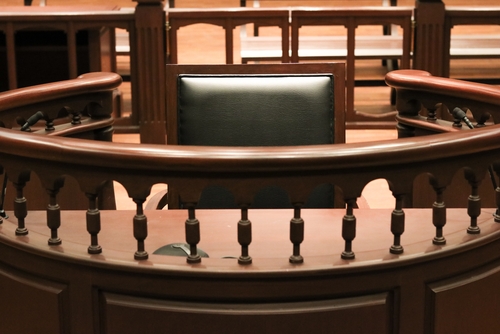BigLaw firm's 'misrepresentations and passive obstreperousness' prevented witness testimony, judge says

A Virginia judge ordered a company, then known as NortonLifeLock, to pay 2.6 times the patent infringement award of $185 million obtained by Columbia University, citing “substantial and egregious misconduct throughout the litigation.” Image from Shutterstock.
A federal judge in Virginia has held lawyers at Quinn Emanuel Urquhart & Sullivan in civil contempt while ordering its former client to pay enhanced damages for “abhorrent litigation conduct.”
U.S. District Judge M. Hannah Lauck of the Eastern District of Virginia ruled in two Sept. 30 opinions that were unsealed Oct. 20.
Lauck ordered the company, then known as NortonLifeLock, to pay 2.6 times the patent infringement award of $185 million obtained by Columbia University, citing “substantial and egregious misconduct throughout the litigation.” Lauck also awarded attorney fees incurred after a remand of the case.
According to Lauck, NortonLifeLock prevented a damaging witness from testifying at trial, consistently rehashed settled issues, and improperly cross-examined witnesses.
Lauck found Quinn Emanuel in civil contempt for refusing to comply with an order regarding its communications with the damaging witness. As a sanction, Lauck said she would take the “egregious behavior” into account in her findings regarding enhanced damages against Norton.
The litigation misconduct “has been some of the most ‘egregious’ this court has ever observed,” Lauck said.
Lauck was appointed by former President Barack Obama to the bench in the Eastern District of Virginia. Previously, she had been a U.S. magistrate judge in the district since 2005.
Quinn Emanuel was NortonLifeLock’s initial lead counsel until shortly before trial, when the company’s second lead counsel, Latham & Watkins, took over the lead role. Quinn Emanuel had sought to withdraw its lawyers’ pro hac vice appearances three days before trial, but Lauck denied the motion based on their “past egregious conduct,” she said in a footnote.
Lauck blamed the damaging witness’s failure to testify on Quinn Emanuel. The witness, Marc Dacier, was formerly the senior director of Norton Research and was at the center of one of three patents at issue in the case.
Dacier had stated in a nonparty deposition that Columbia University professors should have been listed as co-inventors on one of the patents because the technology “is really just a result of our joint brainstorming.”
According to Lauck, after Columbia University identified Dacier on its witness list, “Norton interfered and filed a baseless motion for sanctions against Columbia.” The motion claimed that Columbia University was engaging in ex parte communications with Dacier, even though he was represented by Quinn Emanuel.
After that, Quinn Emanuel incorrectly informed Dacier in a “flagrant misrepresentation” that the court had determined that Quinn Emanuel lawyers represented Dacier, Lauck said. The lawyers said NortonLifeLock did not need anything from Dacier.
NortonLifeLock then argued that Dacier was not available to testify because he had indicated that he didn’t want to travel from Saudi Arabia for the trial, and he was outside the court’s subpoena power.
“The record abundantly shows that Norton, through its counsel, prevented Dr. Dacier from testifying at trial through a combination of active misrepresentations and passive obstreperousness,” Lauck said.
Lauck said Quinn Emanuel violated her March 2022 order to provide information that it received while representing NortonLifeLock and Dacier. NortonLifeLock contended that the information was privileged, and it would not disclose it absent appellate review.
Latham & Watkins was not NortonLifeLock’s counsel at the time of the 2022 order. But Lauck said Latham & Watkins “poured fuel on the fire” by hiding key communications with Dacier from the court during a final pretrial conference April 7, 2022.
Those communications consisted of emails sent between April 5 and 7, 2022, in which a Latham & Watkins lawyer introduced himself to Dacier, said he was working with Quinn Emanuel, and expressed his desire to have Dacier testify. Dacier responded that he is “happy to help the judicial process” and has continuously said so.
Dacier said he couldn’t come to the United States from Saudi Arabia, however, on such short notice. He also confirmed that his testimony would be harmful to the case, and he can see now see the reason for Quinn Emanuel’s actions “while pretending” to represent him.
Latham & Watkins forwarded the emails to Columbia University on the night of April 7, 2022. Columbia University disclosed the emails to Lauck.
Lauck allowed jurors to see Dacier’s videotaped deposition testimony and to consider that his live testimony would have been harmful to NortonLifeLock.
Law360 had coverage of Lauck’s opinions, while Bloomberg Law had earlier coverage. The publications cited a statement by Quinn Emanuel in which is said it “respectfully disagrees with the district court’s finding and will be making our legal response in due course.”
NortonLifeLock, which is now known as Gen Digital Inc., also told Law360 in a statement that it respectfully disagrees with the ruling and will file an appeal.



